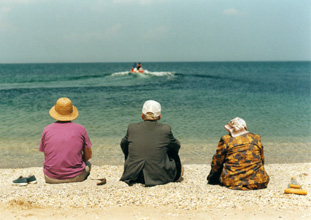Geschichten aus dem Lepratal
Tales From Leper Valley
Andrei Schwartz
Deutschland 2002 |
| |
|
 |
|
|
CineStar 8
14.02., 21.30
CineStar 8
15.02., 16.30
|
|
|
|
|
Produktion: Wüste Filmproduktion,
NDR, Arte
Weltvertrieb: Wüste Filmproduktion,
Schulterblattstr. 58, D-20357 Hamburg
Tel.: (4940) 431 70 60, Fax: 430 00 12
e-mail: wueste@wuestefilm.de
Buch: Andrei Schwartz
Kamera: Bernd Meiners, Gabor Halász
Schnitt: Zsuzsa Csákany
Ton: Pascal Capitolin, József Kardos,
Sorin Nitescu
Musik: Gheorghe Vantea, Stelica Tandica
Format: Video (DigiBeta)
Länge: 90 Minuten
Sprache: deutsch, rumänisch |
|
|
|
|
Inmitten des Donaudeltas liegt im südöstlichen Rumänien
Tichiles¸ti, die letzte Leprastation Europas. 1928 wurde hier auf
den Grundmauern eines verlassenen Klosters das Lepra-Hospital
errichtet. Schon Mitte der dreißiger Jahre waren hier bis zu
zweihundert Leprakranke auf engstem Raum eingepfercht.
Tichiles¸ti bedeutete für die meisten seiner Bewohner ‘lebenslänglich’.
Noch heute leben hier, von der Welt vergessen, achtundzwanzig
Patienten. Trotz Holzbein, Stumpf und Prothese haben
sie es verstanden, sich ein Stück Spaß am Leben zu
bewahren. Und wenn im Mai die Musikanten kommen, schwingt
auch der letzte sein Holzbein, wenn auch mancher wohl zum
letzten Mal. Vasile Tÿ arÿõtÿ a, ‘der Bürgermeister’, wird
seine Frau
schon kurz danach begraben. Und im September muss Tatulea
seine dritte Geliebte Mandolina zum Friedhof tragen. Doch zuvor
tafeln sie zum Abschluss der Weinernte noch einmal zusammen.
„Mich hat in Tichiles¸ti am meisten verwundert, wie wenig diese
Leute trotz ihrer Gebrechen und der jahrelangen Isolierung
zu Patienten mutiert sind. Sie sind in erster Linie Männer und
Frauen geblieben, die mit allen Wassern gewaschen sind. Als
diese Lepraveteranen vor über fünfzig Jahren das Tor zum ersten
Mal passierten, hieß es schließlich ‘rien ne va plus’.
Und
wer den großen Croupier so lange zu überlisten verstand, besaß
inzwischen genügend Chuzpe und Galgenhumor, um es mit einem
Filmteam aufzunehmen.“ Andrei Schwartz
|
| |
|
|
Tichiles ¸ti in south-eastern Romania is
Europe’s only remaining leper colony. In
1928, the Leper Hospital was established
on the foundations of a deserted monastery.
By the mid-1930s, it housed as many
as 200 lepers in confined quarters. For
most of them, Tichiles ¸ti meant a life sentence.
Today, the colony is still home to 28
people, some of whom have been here for
over 70 years.
The central focus, however, is on the residents
of the leper hospital, who have been
able to retain their love of life with all their
little tricks, despite their wooden legs and
amputated limbs. No joke is so awful that
it can’t be told. And when the musicians
come in May, they will all swing their
wooden legs, though for some, it will no
doubt be for the last time. Vasile Tarita,
“the Mayor“, will bury his wife soon after.
And in September, Tatulea will have to carry
his third lover, Mandolina, to the grave.
But before then, the two of them will dine
together on completion of the grape harvest.
Tatulea will prepare a magnificent
fish supper for Mandolina, they’ll eat and
row with each other as a matter of course,
just like the rest of the year.
“What astonished me most about Tichiles¸ti
was to what little extent the people there
had mutated into patients, despite their
afflictions and the long years of isolation.
First and foremost, they have remained
men and women, who incidentally know all
the tricks in the book. When these veteran
lepers passed through the gates for the
first time over 50 years ago, for them, it
was ‘rien ne va plus.’ And those of them who
have succeeded in outwitting the grand
croupier for all this time certainly possess
sufficient chutzpah and gallows humour to
cope with a film crew.“ Andrei Schwartz
|
| |
|
Biographien / Biographies
Andrei Schwartz, geb. 1955 in Bukarest. Seit 1973 in Deutschland. Studium
der Kunstgeschichte und Visuellen Kommunikation. Autor und Regisseur zahlreicher
Beiträge zum Thema Osteuropa. Filme: Rumänien (1990), Auf der
Kippe (1995-97). |
